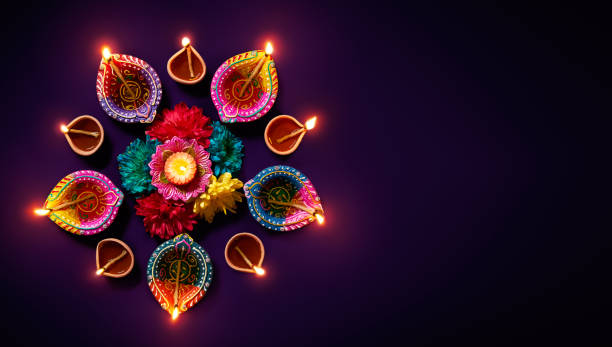
Diwali is a celebration that encompasses and surrounds all cultures and beliefs. That is the only reason Diwali is India’s most well-known celebration. From educational poojas for religious lovers to all-night card parties, the five days of Diwali contain something for everyone.
Diwali lasts not only five days, but practically a whole week, with celebrations spanning five days and after-effects lingering for the remaining two days. The beauty of this festival is the convergence of five distinct concepts, each of which manifests itself in unique thinking or ideal each day. As a result, people celebrate with genuine intelligence every five days of celebrations in order to improve their lives.
From a local jeweler to a local potter, it’s a genuine market celebration. Much is accomplished, and even the poorest and most neglected members of society are assisted in earning money through legal ways. Lord Kuber’s blessings can also be obtained by purchasing a Kuber yantra.
Dhanteras is the first day of Diwali Week.
The first day of Diwali week, Dhanteras (Dhanvantari Trayodashi), marks the official start of the glittering Diwali celebrations. According to the Hindu calendar, today is the 13th lunar day of the Krishna Paksha, the dark quarter of the month of Karthik.
Dhanteras is indeed a noteworthy day since it is said that Lord Dhanwantari arrived from the sea with Ayurveda, a medicinal science, for the benefit of humanity on this day. This day sees a lot of buying, especially of gold, silver, and valuable stones, as well as jewelry, new apparel, and utensils.
Hindus cleanse and pray for the protection of Yama Raj, the Lord of Death, with a lit diya, Prasad, at sunset (sweets offered during worship). This sacrifice is made near the Tulsi tree, Holy Basil, or any other sacred tree in the yard. You may also order an online Lakshmi Puja, which will be done particularly for you by our knowledgeable Pandits. The Diwali celebrations begin on this day.
Choti Diwali is the second day of Diwali Week.
The second day of Diwali week is known as Kali Chaudas or Narak Chaturdashi. It is simply Choti Diwali, a celebration observed in various regions of India on the second day of Deepavali. On this day, Lord Krishna is said to have destroyed Narakasur’s demon, thereby liberating the universe from dread.
On this day, it is thought that the body should be rubbed with oil to relieve exhaustion, bathed, and slept in order to celebrate Diwali with vim and sympathy. It is also believed that you should not light diyas or leave your home on this day. In current times, however, individuals visit each other on Choti Diwali to wish each other a “good, prosperous Diwali” and share presents and sweets.
The third day of Diwali Week is the actual Diwali Day.
The true Diwali is celebrated on the third of the five Diwali days. It is a day dedicated to Goddess Lakshmi and Lord Ganesha. Hindus purify themselves and gather with their families and Pandits (priests) to worship the Divine Goddess Lakshmi for the benefits of prosperity and wealth, the triumph of good over evil, and light over darkness. People are burning diyas and candles in their houses, while millions of crackers, crackers, and fairy lights are on the streets across India.
Fourth Day of Diwali Week – Vishwakarma Day Following Diwali
In India, the fourth of the five Diwali days are celebrated in a variety of ways. In western states such as Gujarat, this day is celebrated with grandeur as Bestu Varas, the new beginning according to their calendar. This very day, when people worship their instruments, weaponry, and equipment, is typically celebrated as Govardhan Puja and Vishwakarma in Northern Indian states. As a result, most or all businesses are closed on this day. This day is also known as Annakut. Several thousand years ago, Lord Krishna took the inhabitants of Vraja to Govardhan Puja. Since then, Hindus have worshipped Govardhan every year to commemorate the first Puja of the Vraja people.
Bhai Dooj is the fifth day of Diwali Week.
The fifth and last day of Diwali is known as Bhai Dooj or Bhai Beej. On this day numerous moons ago, Yama (Yamraj, the Lord of Death) visited his sister Yamuna during the Vedic period. He bestowed a Vardhan (a blessing) on his sister, promising that anybody who visited her that day would be cleansed of all sins and achieve moksha, or final emancipation. Since then, the brothers have visited their sisters and children to enquire about their well-being, and the sisters have prepared sweets as a token of affection for their brothers.
On this day, the five-day Diwali celebrations come to a conclusion.
In a Nutshell
Dhanteras, Chaturdashi, Diwali, Govardhan Puja, and Bhai Dooj are the five days of Diwali. The greatest time to start a new business is during Diwali. We should worship Lord Ganesha and Goddess Laxmi in our houses on this auspicious day to bring health, wealth, happiness, and success.
A very joyful and successful Deepawali to you!
